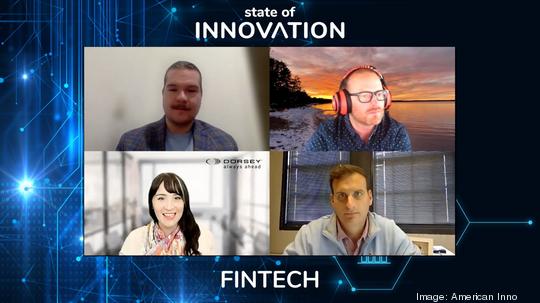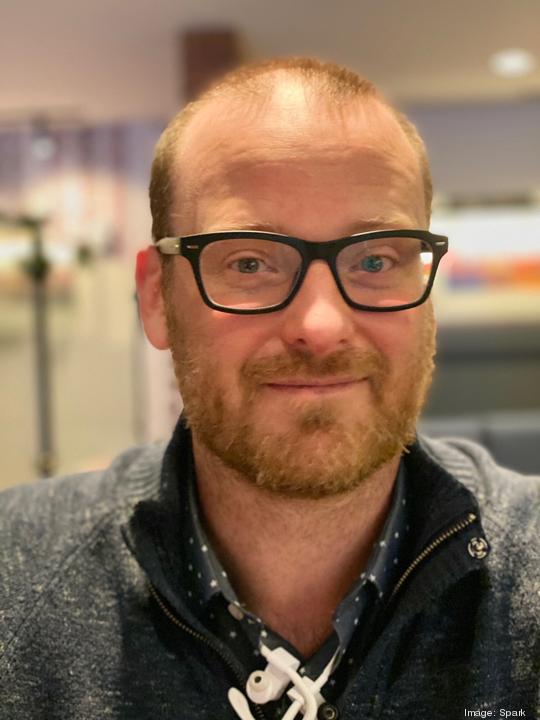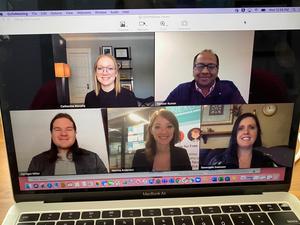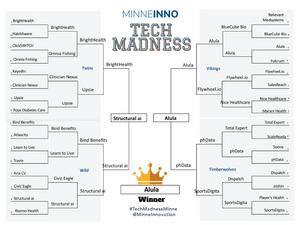
Until recently, the banking industry was thought of as a relative dinosaur: slow to change and relying on the same tools and processes it had for decades.
However, since the Great Recession, finance has been transformed by new technology tools, with Minnesota emerging as a hub of fintech activity. At Minne Inno's State of Innovation: Fintech event, players in the local fintech space discussed how the industry got here, and where it will go next.
The panelists were Erin Bryan, a partner at law firm Dorsey & Whitney who focuses in financial services and banking; Nick Elder, CEO of lending services company Spark; and Cale Johnston, a principal product strategist at fintech firm Q2 and the former founder and CEO of fintech company ClickSwitch before it was sold to Q2.

Before the panel, three local fintech startups pitched their products. The three startups were WeSparkle, a software-as-a-service company that helps minority entrepreneurs run their businesses with AI tools that help sell products and book meetings easier; SoleSafe, an early-stage insurer for sneakers; and CheqrPay, a software company that makes fundraising easier for nonprofit organizations. WeSparkle was founded by Michelle Tran Maryns, while SoleSafe was founded by Phil Terrill and CheqrPay was founded by Leslie Villaincourt.
The panelists reflected on how much their industry has changed, especially since the Great Recession, which spurred the transformation.
"Before 2007 or 2008, banks didn't have to try that hard. They were the first stop on the customer's journey, always. But then as that explosion took off after the Great Recession, these guys just zeroed in on customer experience," Elder said.
Customers wanted efficiency most of all, which meant pushing banking online as much as possible, Johnston said.
"You look at from the past seven years of what happened in fintech, all the startups that have emerged are taking paper-based processes and they're digitizing them and they're creating companies out of them because the banking industry was just behind," Johnston said.

For technologists, the shifts have been exciting. For lawyers and regulators, it can be overwhelming.
"The technology is developing more quickly than the law is and we're really just playing catch-up," Bryan said. Smaller banks, sometimes called challenger banks, and neobanks, which only operate online, aren't currently as heavily regulated as their traditional cousins like Wells Fargo & Co. For example, when ClickSwitch works with a smaller bank, it can get its tools implemented much quicker than at a legacy bank, Johnston said, but that could change soon.
"You're going to start seeing this war of regulation going on," Johnston said.
The Covid-19 pandemic has only increased the rate of digital change in the financial industry. At ClickSwitch, which helps customers switch their bank accounts, the change was rapid once the pandemic prevented customers from meeting face-to-face with a banker, Johnston said.
The pandemic also provided opportunities for challenger banks and neobanks, Bryan said. Some of the largest Paycheck Protection Program lenders in the country were fintech companies like Atlanta-based Kabbage, which made 113,145 loans, and Cross River Bank of Fort Lee, N.J., which made 100,337 loans.
While commercial banks have traditionally been more focused on building relationships with their clients, online banks are better positioned to quickly handle high volumes of requests, something that helped them punch above their weight with PPP loans, Bryan said. Their reliance on the latest tech tools was also a boost.
The pandemic has also brought a greater potential for fraud as more traditional banks moved their services online. Hacking is also a growing risk, and financial institutions are starting to invest heavily in data security, Bryan said.

Fintech companies do have their own forms of auditing and regulations that they have to pass, which could be a lucrative opportunity for the right entrepreneur, Elder said
"If I had to do it all over again, I'd probably start a SOC 2 company," he joked, referring to an auditing procedure that software companies that handle consumer information have to go through.
"You do a report once and then you just charge everybody $25,000 a year to renew it!" he said.
Here are some other highlights from the event:
Elder on other industries and companies trying to replicate the success of fintech: "The risk that people have is if you isolate technology by itself and classify it as a silver-bullet strategy. It just doesn't work that way. We break what we do into four parts, which are the people, the process, the technology and then how that ultimately translates to the customer experience. If you're not thinking about it in that holistic view, that's where you run a risk. If you don't know what a process is, it's very hard to fix it. Make sure you understand the problem that you're solving and make sure you really like solving that problem, because once you solve it, you're going to unlock a much bigger version of the same problem."
Johnston on where we'll see tech innovation next: "What's next is a dangerous game, but these community banks and credit unions need to get competitive with these challenger banks and neobanks that are popping up, and I think we're going to see better technology within community banks. One thing in particular that I think is going to get digitized is the lending process of getting your mortgage or your auto loan. I think we're going to see banks get more aggressive when it comes to lending because it is more competitive."
Bryan on the pitfalls of designing a great fintech user experience: "We have seen some challenges with strategies to increase the personalization of the experience, which tends to rely heavily on customer information, and so there's a lot of risk in that. A lot of consumers are very wary of feeling like their business providers know too much about them, and yet they want a good, personalized experience. And also privacy regulation changes so quickly. We almost have this state-by-state patchwork, and then we have different requirements in the European Union. It's an area where we're getting a lot of questions about how to do this right."








